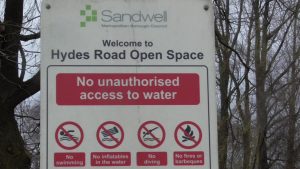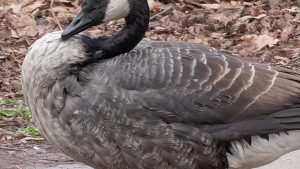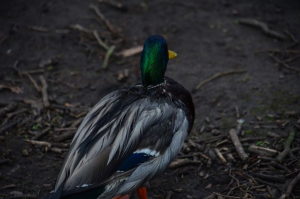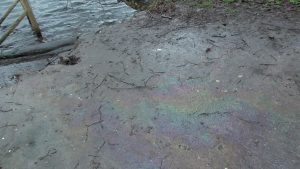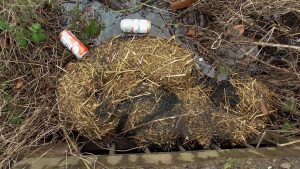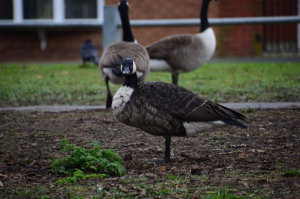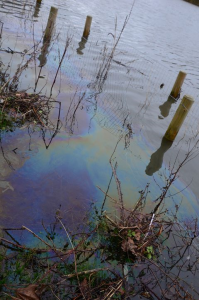In what is now becoming a depressing familiarity, yet another spillage of diesel in a local pool has resulted in severe problems for wildfowl living in the water that it has invaded.
Woden Road South Pool in Wednesbury, sometimes oddly referred to as Hydes Road, is the latest casualty of this vile liquid’s ubiquitous presence in our natural environment causing havoc.
Let me firstly explain why this substance is so damaging to wildfowl and their ability to waterproof themselves after they have come into contact with it. Wildfowl have contour feathers and down feathers, the structure of which is shown in the diagram below.
Body feathers form a continuous waterproof layer over the body. Down feathers provide insulation and buoyancy. The structure of the contour feathers in a criss- cross character allows an air space which creates an impenetrable formation which repels water. Birds preen themselves regularly to keep the feathers in good condition by using oil from their preen glands.
When coming into contact with sticky contaminants like diesel, the feather structure becomes clogged and causes them to clump together. The air-water interface in the feather is lost and the birds become non waterproof causing them to stay out of the water and become vulnerable to predators. They are also prone to hyperthermia in harsh weather.
The problem with birds is that they continue to preen themselves during this process which results in rubbing in the diesel over their whole bodies, so they eventually become totally smeared in the substance. Ingesting this toxic material can also have consequences of diarrhoea and dehydration, which also need to be treated.
The process of washing a typically oiled bird can take up to one hour, requires a constant temperature and several washes to remove all of the contaminants from the feathers. This is a very stressful process for the birds and usually fairy liquid is used in solution.
At Woden Road, just about every wildfowl on the lake was covered in diesel, the cause of which has not as yet been determined. It is clear that an inlet into the vastly swollen pool is the main source from which it is flowing, and this may be due to some idiot or business tipping contaminants irresponsibly down the drain which unfortunately leads directly into this pool. There is an unexplained accumulation in the centre of the pool which appears separate to this. There were also however spillages on the path at this site, which could not have simply been run off from the road.
Though the council put a bale of straw in the inlet, this doesn’t appear to have had much effect, as the pool is probably over 1 foot higher than normal. The spillage has continued all week and has not been stopped and the source tackled. This means that more birds are likely to be affected until someone pulls their finger out to detect it.
There have been other spillages of diesel , mainly on canals in the area in recent times, in Tipton, Oldbury and Walsall. All of these incidents have resulted in birds being covered and having to be rescued by volunteers and the RSPCA. It is becoming a very expensive repetition due to someone’s ignorance and carelessness, and also that of society which consumes so much of this killer.
Some of these incidents may have been caused by industrial concerns but many involve the use of marine boat craft on canals, and one can only hope that the eventual ban of all boats using this fuel is not far off. Electric energy and recharging points are the only solution to this major environmental pollution. I pressed The Canal and Rivers Trust for a comment regards how this unclean form of current transport is destroying the waterways, particularly around boat yards where the grime is spewed out in copious amounts, but is never cleaned up by anyone. There has been a great hoo-ha about so called “climate change” and suggestions of reducing transport and reliance on vehicles on the roads in major cities and eventually phasing out diesel cars (amen to that), but why should boats on the waterways escape such a debate? An ecologist at the trust stated the following when I put the question to them.
“With regard to your query regarding electric boats, I have the following information. We offer an “electric boat” discount on boat licences as an incentive to move away from diesel. We are also having discussions with relevant government departments on what a ‘zero emissions’ world would mean for inland waterways. So in answer to your question, it is on our agenda and we are taking steps in the right direction but as I am sure you will appreciate, this is not something that will change overnight.”
Perhaps it’s about time running a diesel powered boat became a much more expensive hobby to encourage this change a little more quickly!
Without doubt the most frustrating part of these incidents is the total lack of response from The Environment Agency to date. You are invited to ring their “incident hotline number” on 0800 80 70 60 to report such pollution incidents, 9so far I have put in three calls), yet it is increasingly clear to me that this number is a massive Government fraud, as due to the unfit for purpose Common incident Classification Scheme, which I have looked at HERE, these reports are just shut down if they are classed as being “category three”, without any attendance whatsoever.
Let me be clear, The Environment agency staff are paid to do a job, the volunteers who rescue the affected birds and rescue centres that have to deal with them are not. The current level of service from the EA in response to these incidents is absolute shit. They are so keen to attend incidents which involve fish deaths-(the source of their quangos funding), yet they care nothing for wildlife above the water line, soiled by an industry they fail to also regulate from emitting such pollution.
One can see a time when members of the public have to effectively clean up these spillages themselves, and perhaps also attempt to trace back the pollution to the source it came from. In such circumstances where the polluter is known, but the EA fail to prosecute, they should perhaps be unsurprised when those who are forced to do their jobs for them start to operate outside of the law and decide to take direct action revenge on the polluters by using some fuel of their own.

